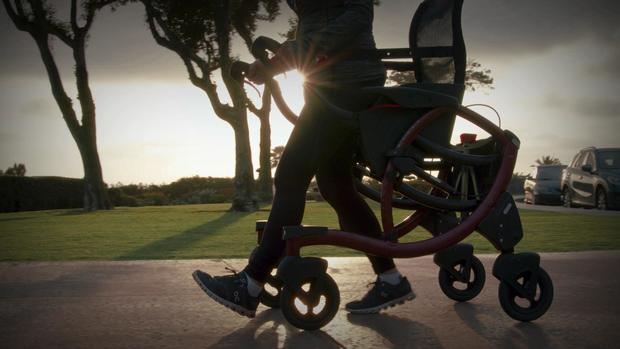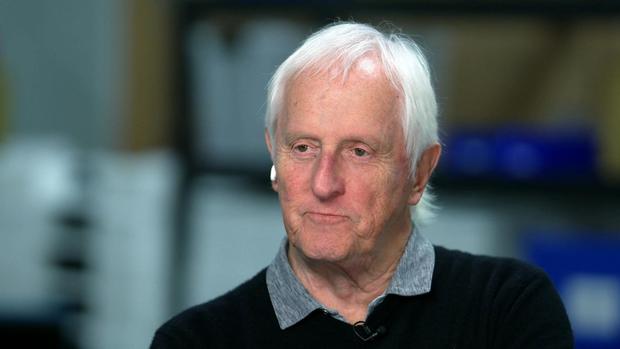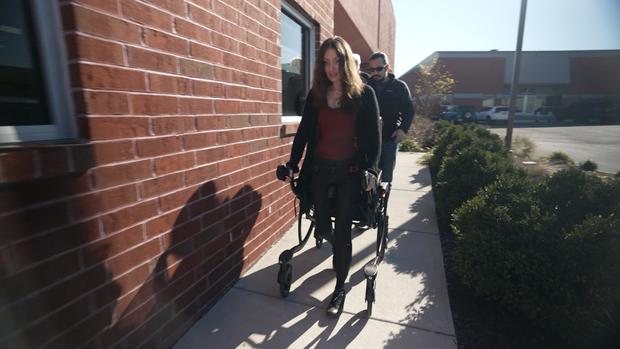When watching TV or movies, smooth, steady shots are something some take for granted. They somehow move quickly across the floor without any bumps or a sense of vertigo.
As it turns out, viewers can thank Garrett Brown and his groundbreaking invention, the Steadicam, for those shots.
The Steadicam is a lightweight, hand-held stabilizer that gives camera operators a steady hand when on the move to capture shots like Sylvester Stallone’s character, Rocky, running up the steps of the Philadelphia Museum of Art.
Now standard issue, the Steadicam has evolved beyond film. There’s the sky cam, the fly cam and the dive cam.
We met Brown five years ago, on assignment for “CBS Sunday Morning,” in the throws of retirement. Now, he’s back with a new invention to help people with disabilities move with the same smoothness as his Steadicam.
He calls his latest invention the Zeen.
“What is it that we need? We need a comfortable chair,” Brown told “CBS Saturday Morning” co-host Michelle Miller. “We need to not have to ditch that chair to get moving. But hey, let’s get to your feet without the whine of motors and slow vvvvvv– you know, let’s get to your feet like a kid.”
The 80-year-old came up with the idea a decade ago, while visiting his then-97-year-old dad in care facilities.
“I was watching his pals,” Brown said. “And something big seemed to me missing between walkers and wheelchairs. Once you consign yourself to a wheelchair, your feet are not on the ground particularly. You’re not upright. Being upright is great for your cardiac, your bone density, your– your limbic system, your digestive system. And it’s particularly valuable for your psychological well-being. To be up among your fellow humans is one of the things we hear most often that they love about this machine.”
It took about a decade of inventing and tinkering for Brown and a small team of engineers to get the machine just right. Starting with prototypes, some that look rather ridiculous to Brown now.
“I took an old walker and had this saddle welded onto it just to see what’s this feel like,” Brown said. “You have to be willing to look fairly goofy and silly when you’re testing prototypes for machines that work with humans.”
He began marketing them at health care conventions, AARP conferences, anywhere he could reach people with limited mobility. To date he’s produced about 100 Zeens.
It’s already attracting customers like Anomie Fatale, who relied mostly on her powered wheelchair and rollator.
“With the rollator there is absolutely no support,” Fatale said. “All of my energy when I use that requires me to focus on not falling, which is why i can’t even use a rollator without assistance.”
On the day of our visit, she tried out her new Zeen.
“Not being able to do a sit to stand yourself like that,” Fatale said, “it gives you back something that you lost that you miss every day.”
Brown noted the Zeen’s benefits.
“The instant that we give you this, A. degree of freedom, and, B. autonomy. And that’s an important word with this,” Brown said. “When you’re in it and you’re safe, you’re on your own.”
It’s become almost a higher calling. Made even more evident last fall, when Brown traveled to Rome to make a special delivery.
“I was looking at a video report of Pope Francis struggling with mobility,” Brown said. “I thought, ‘He could use one of these things.'”
The letter he wrote must have been a persuasive one.
“It went around the Vatican,” Brown said. “And we were vetted. And didn’t we get back a wonderful letter saying, ‘Yes, we accept. Thank you very much.'”
“And we heard later it’s in his apartment. So this story is unfolding,” Brown continued. “No official citing, but, you know, if– if it’s useful to Pope Francis, that would be really, really satisfying.”
Brown is hoping to get word out to anyone who can benefit from the Zeen that his new invention is here to help.
“Inventing is what we do for a good life,” Brown said. “Inventing a life is imagining what you want, that is to say, what’s missing, and what do you have to do to get there.”

 Latest Breaking News Online News Portal
Latest Breaking News Online News Portal







